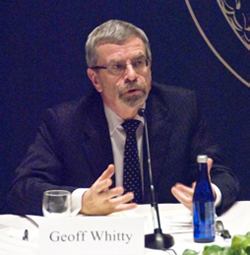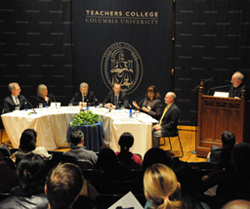Sharing Reforms Across the Pond
Education policy has been so frequently shared across the Atlantic that sometimes champions of particular measures forget where their proposed reforms originated
Of education innovation in the U.K. and U.S.
Education officials in England and the United States should step up their sharing of research and policy reform ideas across the Atlantic—especially in the areas of school choice and accountability.
That was the thrust of a speech delivered by Geoffrey Whitty, Director of the Institute of Education (IOE) at the University of London, at Teachers College on November 8.
Both countries are embroiled in well-publicized debates about education reform as they have fallen sharply in global rankings of education quality and performance. If they are to regain their status as world leaders in economic growth, both will need to address the inequities in their education systems, Whitty told an audience in TC’s Milbank Chapel.
The two countries have exchanged education policy reform ideas and efforts at least since the early 1990s. England’s grant-maintained schools influenced the early charter school movement in the United States, and its use of national standards and high-stakes testing preceded the passage of the federal No Child Left Behind education bill and national curriculum efforts here.
In turn, England currently is eyeing U.S. charter schools (the Harlem Children’s Zone and KIPP schools, in particular) as models for free schools and academies in England. Geoffrey Canada, founder of the Harlem Children’s Zone, addressed the U.K.’s Conservative Party annual conference last month; and Arne Duncan, Secretary of Education in the U.S., visited a London school earlier this fall. England is also increasingly interested in American teacher training models (Teach for America here inspired Teach First in England).
In fact, education policy has been so frequently shared across the Atlantic, Whitty said, that sometimes champions of particular measures forget where their proposed reforms originated and how they played out in the past. In fact, Whitty said, at a Conservative Party meeting in October, Michael Gove, the Conservative Secretary of State for Education, seemed to demonstrate precisely that kind of amnesia in his support of charter schools.
The result is that too often, education policy on both sides of the Atlantic is justified by anecdotal evidence and “quasi-research carried out by think tanks and advocacy groups” that have a particular political point of view, Whitty said, instead of by the rigorous, careful research of academic institutions such as the IOE and TC—a problem that both institutions can help rectify.
In his speech at Teachers College, Whitty encouraged intellectuals to hold their ground as the most legitimate critics and deepest thinkers about policy and pedagogy, despite attempts by some politicians and public officials to denigrate their usefulness. “Education researchers can help in challenging [the prevailing] narrative and changing the terms of the debate by reinforcing messages, not just about what works, but also about what doesn’t work and why it doesn’t work,” he said, adding that the IOE and TC “could learn huge amounts from each other, and I hope we can find ways to get that sort of collaboration underway.”
The theme of cross-cultural innovation in education was amplified later that same evening by a panel discussion that included, Whitty; TC President Susan Fuhrman; Richard Lee Colvin, Director of the Hechinger Institute on Education and the Media at Teachers College; Tim Daly, CEO of the New Teacher Project (U.S.); Andrew Hargreaves, Thomas More Brennan Chair in Education at the Lynch School, Boston College; and Rona Kiley, Founder of the U.K.’s Teach First and former CEO of the Academy Sponsors Trust (U.K.); and moderated by Jonathan Daube, the IOE’s alumni ambassador in the U.S. and interim president of Middlesex (Connecticut) Community College.
Several of the panelists predicted technology would be among the most important drivers of innovation in education during the next two decades.
“In five to 10 years, Generation Y, who were born digital, will become the leaders of schools,” Hargreaves said. “Teachers will be thinking about technology as a way to organize their instructions and develop their schools as organizations.”
Fuhrman said that “new technology will allow the delivery of customized education to a learner exactly where and in the format in which he or she needs it,” adding that “keystrokes and even eye movements” of users can be recorded and analyzed to improve education.
Colvin predicted “the creation of virtual schools and other modes of delivery that will not necessary be run by traditional school boards.”
And Kiley, who argued that, “through programs like Teach for America and Teach First, teaching will continue to become a more sought-after profession,” said “technology will be essential for people who really want to use it and want to become a part of society and become educated.”
The panelists were uniformly gloomy about progress toward overcoming inequity in educational outcomes and opportunity. Noting that “British schools no longer have to report what they’re doing to enhance social cohesion,” Whitty said that “to remove the notion that there should be any requirement to think about those issues is highly dangerous.”
Daly lamented that “when we talk about equity, we’re not talking about what we want for our kids, but what we’re willing to guarantee kids.” He was sharply critical of his hometown, Chicago, for having “the shortest school year in the country” despite “abysmal academic performance,” but said there had not been a serious discussion among city leaders about changing it.
Fuhrman said that one obstacle to improve on this and on other fronts is that “we don’t have good ways to learn from successful models—regular visitation, sharing of data, exchanges among schools on a broad scale.”
And Hargreaves said that reformers become too vested in championing certain types of reforms rather than looking at the track records of individual efforts. “What we need to celebrate is what goes on in schools, rather than the type of schools,” he said. “It’s not type that produces the results. There is very little honesty about that in the discourse at the moment.”
The group was mixed on the potential impact on education of recent elections in both the United States and the U.K. When President Obama was elected, “there was such a great sense of this being the moment, with the stimulus package, the money for turnaround schools, Race to the Top,” Colvin said, but asked whether the November midterm elections in the U.S. will kill that enthusiasm. “The question now is, does all of that stop? Does the momentum go away?”
Whitty said that “elections don’t make as much difference as you might think,” arguing that “things have changed since the election, but actually in the direction that was already there.” In his view, the Blair government extended policies of both the Thatcher and Major governments by “introducing more privatization” and by “prescribing pedagogy as well as curriculum.”
To view the entire lecture by IOE director Geoffrey Whitty, visit http://bit.ly/eQccCn. To view the IOE forum, visit http://bit.ly/hJpYp1
Published Monday, Dec. 20, 2010

